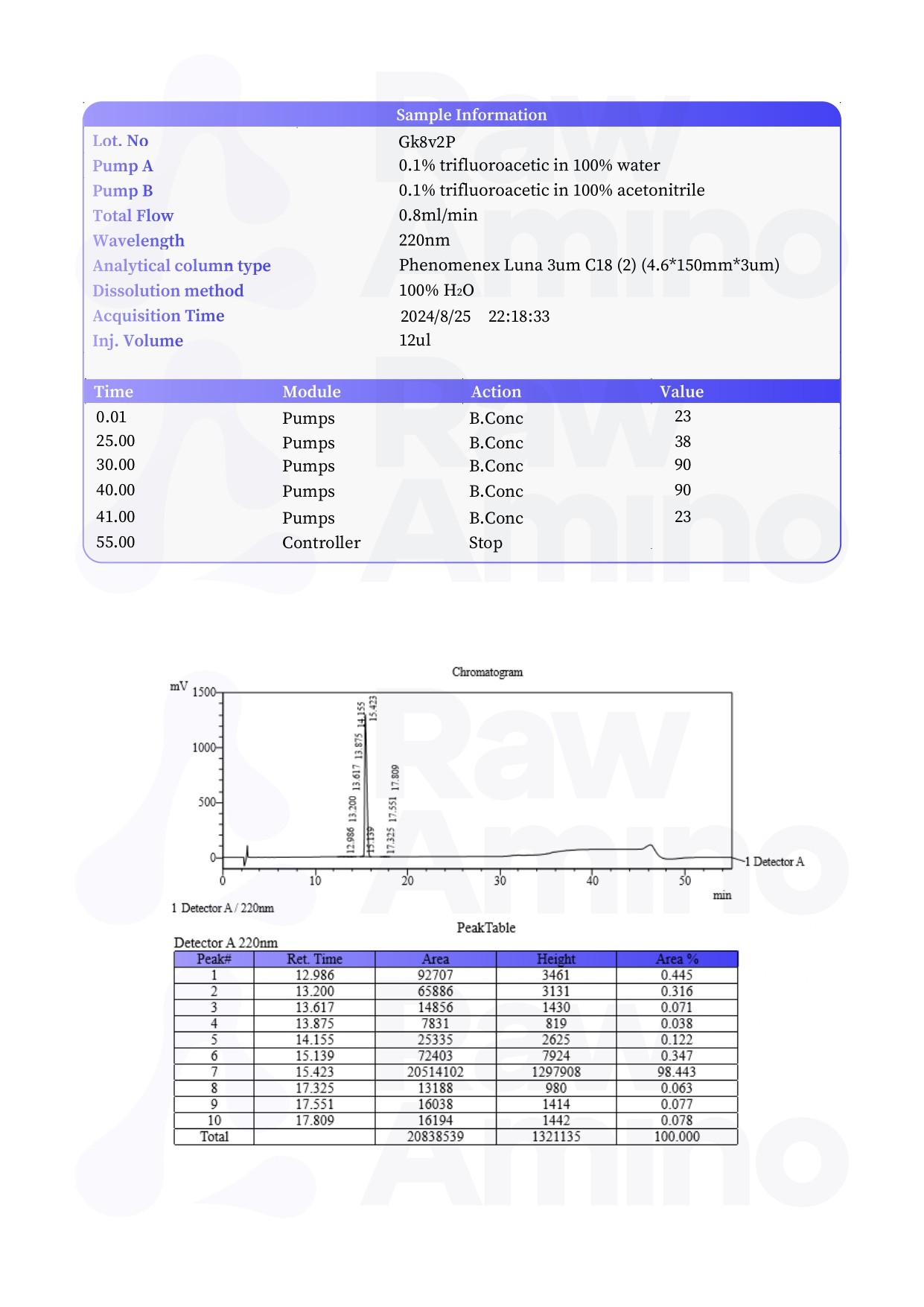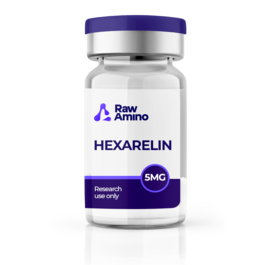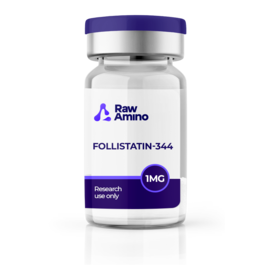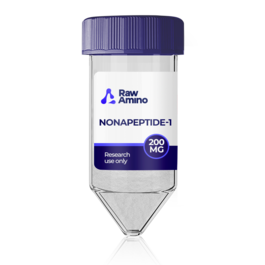
MOTS-c – 10MG
$101.00
Discount per Quantity
| Quantity | Discount | Price |
|---|---|---|
| 5 - 8 | 5% | $95.95 |
| 9 + | 10% | $90.90 |
Out of stock
Scientific Overview of MOTS-c
MOTS-c (Mitochondrial Open-Reading-Frame of the 12S rRNA-c) is a recently identified member of the mitochondrial-derived peptides (MDPs), sometimes referred to as ""mitochondrial hormones"" or ""mitokines."" This peptide has drawn considerable scientific interest due to its potential role in cellular communication, energy regulation, and broader systemic responses. While initially thought to act primarily within the mitochondria, emerging research suggests that the peptide may function through the bloodstream, pointing to wider systemic actions beyond localized mitochondrial signaling.
Alternative Names: 12S rRNA-c, MT-RNR1
Studies and Research Data
Observations in Fat Regulation
Experimental research in murine models suggests that MOTS-c may be linked to adipose tissue function. Studies propose that MOTS-c could promote the development of brown adipose tissue while limiting the accumulation of dysfunctional fat depots. Some investigations indicate that the peptide may act through the AMP-activated protein kinase (AMPK) pathway, a central regulator of cellular energy balance. In models of metabolic stress, the peptide appears to influence lipid handling by shifting energy metabolism toward oxidation processes and away from storage pathways. These laboratory findings raise the possibility that MOTS-c could represent a regulatory factor in systemic metabolic balance.
MOTS-c and Connections to Bone Development
Research exploring skeletal biology indicates that the peptide may influence osteoblast activity, particularly through the TGF-beta/SMAD signaling pathway. This pathway is considered important for osteoblast survival and collagen synthesis, including type I collagen. Studies suggest that MOTS-c exposure might upregulate genes involved in osteogenesis and stimulate markers of bone differentiation, such as ALP, Bglap, and Runx2. Such findings imply that MOTS-c could be relevant in bone formation and skeletal maintenance under certain laboratory conditions.
Links to Cardiovascular Research
Investigations into cardiovascular function highlight MOTS-c’s potential role in vascular biology. Findings suggest that MOTS-c may support endothelial responsiveness and microvascular function, possibly through interactions with nitric oxide pathways and modulation of inflammatory responses. Research indicates that mitochondrial-derived peptides, including MOTS-c, might serve protective roles in stress responses within cardiac tissues. This raises the prospect that MOTS-c could participate in maintaining vascular homeostasis under metabolic or oxidative challenges.
MOTS-c and Muscle-Associated Findings
Several studies suggest that the peptide may interact with skeletal muscle metabolism, potentially influencing energy regulation and glucose uptake. Evidence indicates that MOTS-c could activate AMPK pathways in muscle independently of insulin signaling. Such actions may support enhanced nutrient utilization and energy expenditure. In experimental models, MOTS-c has been associated with improved muscle glucose handling and adaptations under metabolic strain, suggesting it may contribute to systemic energy balance.
MOTS-c Research on Lifespan and Cellular Stress
Emerging literature links MOTS-c with aging and cellular resilience. Hypotheses suggest that MOTS-c may interact with pathways involving NAD+ metabolism and proteostasis, two processes widely studied in the context of cellular aging. By modulating stress response factors such as Heat Shock Factor 1 (HSF1), the peptide might influence cellular adaptation to metabolic strain. Observations in longevity research raise questions about its role in supporting extended cell survival and delaying metabolic decline, though definitive conclusions remain under investigation.
Findings on Physical Endurance
Controlled murine studies suggest that the peptide may contribute to improvements in endurance and coordination. These changes appeared independent of body weight, suggesting that the peptide might influence systemic metabolism and energy flexibility rather than exerting effects tied solely to body mass. Research also points to potential gene regulatory actions of MOTS-c on nuclear-encoded proteins involved in muscle metabolism and proteostasis, hinting at a role in adapting to physical and metabolic stressors.
Conclusion
MOTS-c is a newly recognized mitochondrial-derived peptide that appears to participate in multiple interconnected biological processes, including fat metabolism, skeletal muscle function, cardiovascular signaling, bone formation, and cellular longevity. While research is ongoing and largely exploratory, studies suggest that MOTS-c may serve as a signaling molecule at the intersection of mitochondrial communication and systemic energy balance. Continued investigation is needed to further clarify its role in cellular stress responses, metabolic pathways, and physiological regulation.
References
- Mohtashami Z, Singh MK, Salimiaghdam N, Ozgul M, Kenney MC. MOTS-c, the Most Recent Mitochondrial Derived Peptide in Human Aging and Age-Related Diseases. Int J Mol Sci. 2022 Oct 9;23(19):11991. doi: 10.3390/ijms231911991. PMID: 36233287; PMCID: PMC9570330.
- Qin Q, Delrio S, Wan J, Jay Widmer R, Cohen P, Lerman LO, Lerman A. Downregulation of circulating MOTS-c levels in patients with coronary endothelial dysfunction. Int J Cardiol. 2018 Mar 1;254:23-27. doi: 10.1016/j.ijcard.2017.12.001. Epub 2017 Dec 6. PMID: 29242099.
- Reynolds JC, Lai RW, Woodhead JST, Joly JH, Mitchell CJ, Cameron-Smith D, Lu R, Cohen P, Graham NA, Benayoun BA, Merry TL, Lee C. MOTS-c is an exercise-induced mitochondrial-encoded regulator of age-dependent physical decline and muscle homeostasis. Nat Commun. 2021 Jan 20;12(1):470. doi: 10.1038/s41467-020-20790-0. PMID: 33473109; PMCID: PMC7817689.
- Lee C, Kim KH, Cohen P. MOTS-c: A novel mitochondrial-derived peptide regulating muscle and fat metabolism. Free Radic Biol Med. 2016 Nov;100:182-187. doi: 10.1016/j.freeradbiomed.2016.05.015. Epub 2016 May 20. PMID: 27216708; PMCID: PMC5116416.
- Hu BT, Chen WZ. MOTS-c improves osteoporosis by promoting osteogenic differentiation of bone marrow mesenchymal stem cells via TGF-β/Smad pathway. Eur Rev Med Pharmacol Sci. 2018 Nov;22(21):7156-7163. doi: 10.26355/eurrev_201811_16247. PMID: 30468456.
- Che N, Qiu W, Wang JK, Sun XX, Xu LX, Liu R, Gu L. MOTS-c improves osteoporosis by promoting the synthesis of type I collagen in osteoblasts via TGF-β/SMAD signaling pathway. Eur Rev Med Pharmacol Sci. 2019 Apr;23(8):3183-3189. doi: 10.26355/eurrev_201904_17676. PMID: 31081069.
- Cataldo LR, Fernández-Verdejo R, Santos JL, Galgani JE. Plasma MOTS-c levels are associated with insulin sensitivity in lean but not in obese individuals. J Investig Med. 2018 Aug;66(6):1019-1022. doi: 10.1136/jim-2017-000681. Epub 2018 Mar 27. PMID: 29593067.
- Fuku N, Pareja-Galeano H, Zempo H, Alis R, Arai Y, Lucia A, Hirose N. The mitochondrial-derived peptide MOTS-c: a player in exceptional longevity? Aging Cell. 2015 Dec;14(6):921-3. doi: 10.1111/acel.12389. Epub 2015 Aug 20. PMID: 26289118; PMCID: PMC4693465.
- Lu H, Wei M, Zhai Y, Li Q, Ye Z, Wang L, Luo W, Chen J, Lu Z. MOTS-c peptide regulates adipose homeostasis to prevent ovariectomy-induced metabolic dysfunction. J Mol Med (Berl). 2019 Apr;97(4):473-485. doi: 10.1007/s00109-018-01738-w. Epub 2019 Feb 6. PMID: 30725119.
- Lee C, Zeng J, Drew BG, Sallam T, Martin-Montalvo A, Wan J, Kim SJ, Mehta H, Hevener AL, de Cabo R, Cohen P. The mitochondrial-derived peptide promotes metabolic homeostasis and reduces obesity and insulin resistance. Cell Metab. 2015 Mar 3;21(3):443-54. doi: 10.1016/j.cmet.2015.02.009. PMID: 25738459; PMCID: PMC4350682.
- Kim KH, Son JM, Benayoun BA, Lee C. The Mitochondrial-Encoded Peptide MOTS-c Translocates to the Nucleus to Regulate Nuclear Gene Expression in Response to Metabolic Stress. Cell Metab. 2018 Sep 4;28(3):516-524.e7. doi: 10.1016/j.cmet.2018.06.008. Epub 2018 Jul 5. PMID: 29983246; PMCID: PMC6185997.
Disclaimer:
The products mentioned are intended solely for laboratory research and in-vitro experimentation. They are not approved for human or animal use of any kind. All details provided are for educational purposes only. By purchasing from this site, you agree to comply with our Terms and Conditions.
19 reviews for MOTS-c – 10MG
Only logged in customers may leave a review.







thomas75 –
Good!!
SusanQ –
melissa4276 –
sandra13 –
JasonR12 –
joyce5843 –
walkerluis –
Impressed with the consistency across orders.
WesleyC45 –
KarenJ –
Neo76 –
Product arrived exactly as expected, well packaged. Came on time and as promised, no issues.
Barbara I. –
vial465z –
lab12z –
sandra423 –
Austin I. –
gardnertyler –
Neo76martin –
ion395x –
tiffanyortiz –